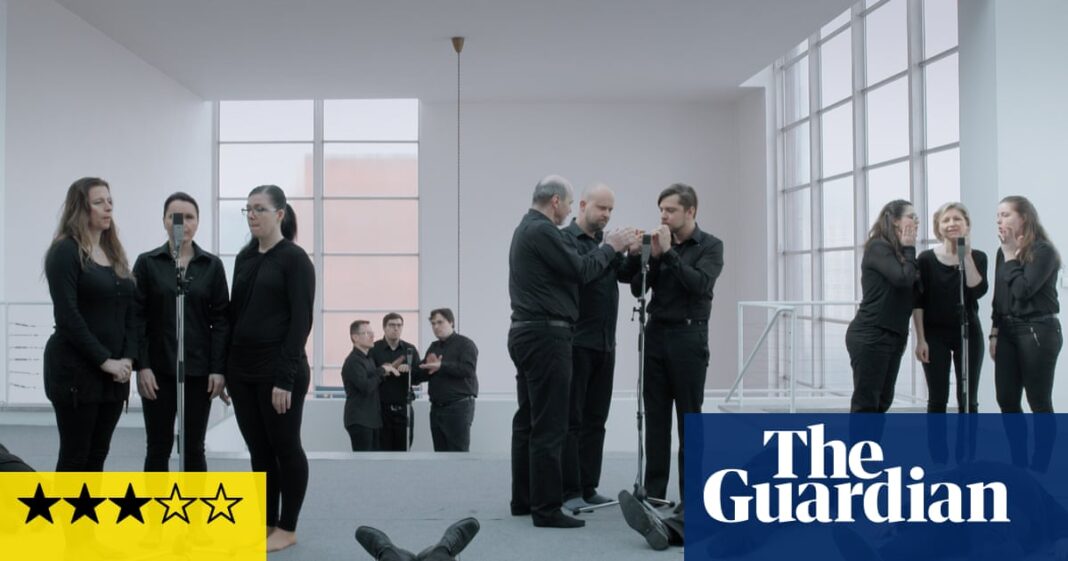Retelling the Complicated Life of Jan Kapr – A Review
Delve into the intricate world of prolific Czech composer Jan Kapr with Lucie Králová’s groundbreaking documentary that intertwines never-before-seen archives with a new libretto from Jiří Adámek. This category-defying film harmonizes Kapr’s triumphs and struggles, shedding light on both his public persona and private life.
Sung in the operatic sprechgesang style, Adámek’s composition weaves a narrative that delves deep into Kapr’s early ideals, his involvement with the communist party, and the pivotal role his propaganda songs played in shaping the party’s ideological landscape. From winning the prestigious Stalin prize to his eventual disillusionment after the Soviet Union’s invasion of Czechoslovakia, Kapr’s story is one of complexity and contradiction.
Imbued with water imagery symbolizing Kapr’s namesake, which means “carp” in Czech, the film blends poignant visuals with lyrical storytelling. The choir, dressed in black against white backdrops, creates a striking contrast that mirrors Kapr’s colorful recordings from the past. Through impressionistic editing, Králová captures the essence of Kapr’s life with both rigour and playfulness.
By breaking away from traditional biographical norms, the film offers a fresh perspective on translating Kapr’s legacy to the screen. The interplay between opera and archival materials adds a layer of depth, although at times, this formal inventiveness may create a sense of detachment that veils Kapr’s artistic virtuosity. Nevertheless, Králová’s bold approach opens doors to a new way of storytelling.
While Adámek’s libretto serves as a compelling narrative device, it occasionally overshadows Kapr’s own musical compositions, leaving room for a deeper exploration of his creative evolution. Including more of Kapr’s music could have offered a nuanced look at his transition from propaganda songs to avant-garde pieces, enriching the viewer’s understanding of his artistry.
Don’t miss the chance to experience “Kapr Code” on True Story from 13 December, where Kapr’s enigmatic journey unfolds in all its glory.
FAQs
1. What is the significance of water imagery in “Kapr Code”?
The water imagery in the film symbolizes Jan Kapr’s namesake, meaning “carp” in Czech, reflecting his deep connection to his cultural roots.
2. How does Lucie Králová’s documentary differ from traditional biographical films?
Králová’s documentary takes a unique approach by blending opera with archival materials, offering a fresh perspective on Jan Kapr’s life and legacy.
3. Why did Jan Kapr distance himself from the communist party?
Jan Kapr’s disillusionment with the communist party grew after the Soviet Union’s invasion of Czechoslovakia, leading him to reevaluate his allegiances.
4. What role did Jan Kapr’s propaganda songs play in shaping the party’s ideology?
Jan Kapr’s propaganda songs were instrumental in bolstering the communist party’s ideological narrative, earning him recognition and accolades.
5. How does Jiří Adámek’s libretto contribute to the storytelling in “Kapr Code”?
Jiří Adámek’s libretto provides a compelling narrative structure that guides the audience through Jan Kapr’s tumultuous journey, adding depth to the storytelling.
6. What is the thematic significance of the choir’s attire in the film?
The choir’s attire, dressed in all black against white backdrops, symbolizes the contrast between Kapr’s public and private personas, offering a visual metaphor for his complex life.
7. How does the film balance between rigour and playfulness in recounting Jan Kapr’s story?
The film strikes a delicate balance between rigour, capturing the essence of Kapr’s struggles, and playfulness, infusing the narrative with creative storytelling elements.
8. Why is Jan Kapr’s transition from propaganda songs to avant-garde compositions significant?
Jan Kapr’s evolution as a composer, transitioning from producing propaganda songs to experimenting with avant-garde pieces, showcases his artistic growth and willingness to explore new horizons.
9. What is the central theme that runs through “Kapr Code”?
The central theme of “Kapr Code” revolves around Jan Kapr’s artistic journey, his ideological conflicts, and his quest for creative expression amidst political turmoil.
10. How does the film “Kapr Code” redefine the boundaries of biographical storytelling?
“Kapr Code” challenges conventional biographical norms by combining opera, archival footage, and inventive storytelling techniques, offering a fresh and engaging perspective on Jan Kapr’s life.
Conclusion
Lucie Králová’s “Kapr Code” reimagines the life of Jan Kapr in a mesmerizing blend of opera, archive materials, and creative storytelling. While the film’s formal inventiveness may occasionally overshadow Kapr’s musical genius, it opens doors to a new era of biographical filmmaking. Dive into the world of Jan Kapr and experience his enigmatic journey like never before.
Tags
#JanKapr #Documentary #Opera #Biography #FilmReview

